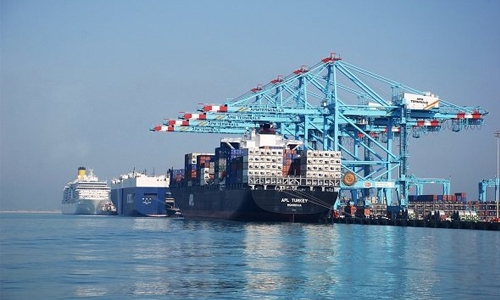APM IPO Bahrain’s most successful: EY
Bahrain witnessed one of the most successful Initial Public Offerings during 2018 in the form of APM Terminals, as the MENA region as a whole raised US$2,946.2m through 26 IPOs in 2018, a new report said. The report lists the IPO of the port operator APM Terminals in Q4, 2018 as Bahrain’s most successful with APM raising US$32 million in Q4 2018. The IPO was oversubscribed by 5.4 times, making it the most successful IPO in Bahrain in over a decade, the report by EY MENA IPO Eye says.
The report, however, says it witnessed a decline in IPO activity in the region as several entities across the region deferred their plans for IPOs. IPO values, according to EY MENA IPO Eye, decreased yearon-year by 24.6 per cent and activity declined by 23.5pc from 2017.
“This can be attributed to various reasons including challenging economic conditions affecting regional businesses and global trade concerns,” said Phil Gandier, MENA Transactions Leader, EY “Regulatory changes and a rising interest rate environment over the past year have also contributed to decreased activity. However, despite the slowdown, 26 IPOs were recorded in the region across sectors over the past year, indicating an appetite for more diversified activity,” added Gandier.
18 deals in GCC
In the GCC, 18 deals were recorded in 2018 with a total value of US$2,564.6m. Saudi Arabia led IPO activity in 2018 with 12 IPOs worth US$1,472.4m.
7 IPO in Q4
In the fourth quarter of 2018, the MENA region witnessed seven IPOs, of which one was a REIT listing, for a total deal value of US$1,085.1m. Saudi Arabia witnessed two IPOs in Q4 2018, including Alkhabeer REIT which raised US$64.1m and the National Company for Learning & Education which raised US$66.7m.
Tadawul is working on several initiatives including launching stock index futures (planned for Q1 2019) and launching a special incentive program for local companies to list. The country is also planning the privatization of more than 20 companies in 2019 in sectors such as water, agriculture, energy, and sports.
To help increase transparency, the government plans to retain minority interests in the businesses and undertake IPOs and other transactions for a certain percentage of each asset.
GCC plan for 2019
Nasdaq Dubai plans to launch futures trading on the MSCI United Arab Emirates equity index in 2019 to provide investors with a new avenue to gain exposure to UAE companies. In Kuwait, S&P has issued a statement that the country will be added to the S&P Dow Jones Global Benchmark Indices with an emerging market classification in 2019. The Kuwait Stock Exchange is currently awaiting MSCI’s decision in 2019 on upgrading the exchange to emerging market status from the current frontier market status.
Gregory Hughes, MENA IPO Leader, EY says: “While the interest from several companies across the MENA region to execute an IPO is high, especially for those looking to access international investors and exchanges, many plans have been delayed for numerous reasons, including underperformance of businesses due to the challenging economic environment, global market volatility, and the time it takes to adapt to public company listing requirements.”
North Africa sees three listings in Q4
In the wider MENA region, Egypt, Morocco, and Algeria recorded one deal each amounting to a total value of US$176.7m. The IPO of Sarwa Capital on the Egyptian Stock Exchange raised US$123.2m during Q4 2018. The government of Egypt delayed the sell-off of a 4.5pc stake in the state-owned Eastern Tobacco Company owing to market volatility.
Many private IPOs tentatively planned for the quarter were also pushed to 2019 citing market volatility. In Morocco, the IPO of Mutandis SCA raised US$44.0m in Q4, making it the second IPO in 2018 on the Casablanca Stock Exchange.
Global IPO
Activity Globally, IPO activity continued to slow down in Q4 2018, with 326 IPOs raising US$53.7b, marking a decrease of 34pc and 10pc respectively, compared to Q4 2017.
Related Posts

